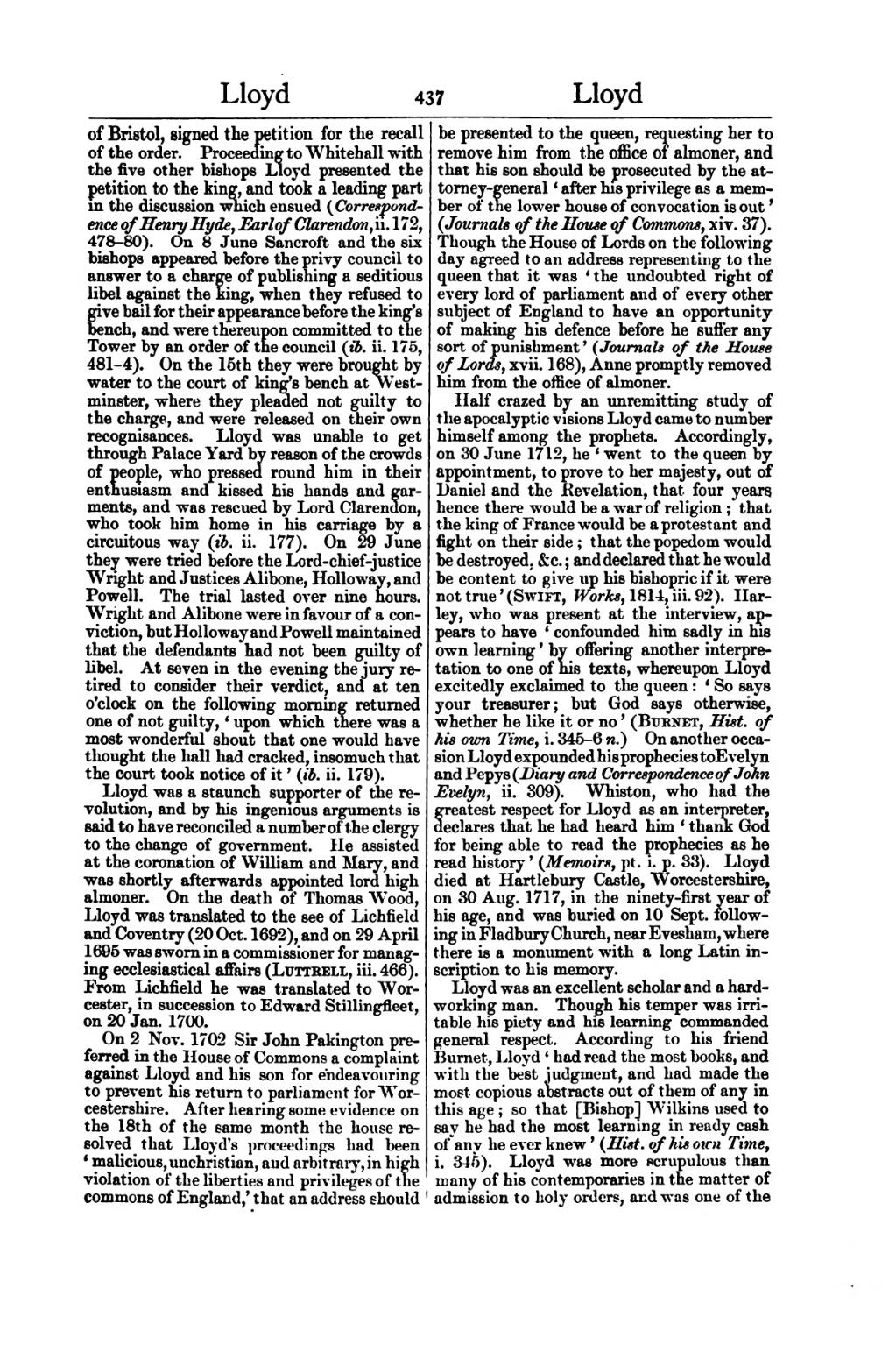of Bristol, signed the petition for the recall of the order. Proceeding to Whitehall with the five other bishops Lloyd presented the petition to the king, and took a leading part in the discussion which ensued (Correspondence of Henry Hyde, Earl of Clarendon, ii. 172, 478–80). On 8 June Sancroft and the six bishops appeared before the privy council to answer to a charge of publishing a seditious libel against the king, when they refused to give bail for their appearance before the king's bench, and were thereupon committed to the Tower by an order of the council (ib. ii. 175, 481–4). On the 15th they were brought by water to the court of king's bench at Westminster, where they pleaded not guilty to the charge, and were released on their own recognisances. Lloyd was unable to get through Palace Yard by reason of the crowds of people, who pressed round him in their enthusiasm and kissed his hands and garments, and was rescued by Lord Clarendon, who took him home in his carriage by a circuitous way (ib. ii. 177). On 29 June they were tried before the Lord-chief-justice Wright and Justices Alibone, Holloway, and Powell. The trial lasted over nine hours. Wright and Alibone were in favour of a conviction, but Holloway and Powell maintained that the defendants had not been guilty of libel. At seven in the evening the jury retired to consider their verdict, and at ten o'clock on the following morning returned one of not guilty, ‘upon which there was a most wonderful shout that one would have thought the hall had cracked, insomuch that the court took notice of it’ (ib. ii. 179).
Lloyd was a staunch supporter of the revolution, and by his ingenious arguments is said to have reconciled a number of the clergy to the change of government. He assisted at the coronation of William and Mary, and was shortly afterwards appointed lord high almoner. On the death of Thomas Wood, Lloyd was translated to the see of Lichfield and Coventry (20 Oct. 1692), and on 29 April 1695 was sworn in a commissioner for managing ecclesiastical affairs (Luttrell, iii. 466). From Lichfield he was translated to Worcester, in succession to Edward Stillingfleet, on 20 Jan. 1700.
On 2 Nov. 1702 Sir John Pakington preferred in the House of Commons a complaint against Lloyd and his son for endeavouring to prevent his return to parliament for Worcestershire. After hearing some evidence on the 18th of the same month the house resolved that Lloyd's proceedings had been ‘malicious, unchristian, and arbitrary, in high violation of the liberties and privileges of the commons of England,’ that an address should be presented to the queen, requesting her to remove him from the office of almoner, and that his son should be prosecuted by the attorney-general ‘after his privilege as a member of the lower house of convocation is out’ (Journals of the House of Commons, xiv. 37). Though the House of Lords on the following day agreed to an address representing to the queen that it was ‘the undoubted right of every lord of parliament and of every other subject of England to have an opportunity of making his defence before he suffer any sort of punishment’ (Journals of the House of Lords, xvii. 168), Anne promptly removed him from the office of almoner.
Half crazed by an unremitting study of the apocalyptic visions Lloyd came to number himself among the prophets. Accordingly, on 30 June 1712, he ‘went to the queen by appointment, to prove to her majesty, out of Daniel and the Revelation, that four years hence there would be a war of religion; that the king of France would be a protestant and fight on their side; that the popedom would be destroyed, &c.; and declared that he would be content to give up his bishopric if it were not true’ (Swift, Works, 1814, iii. 92). Harley, who was present at the interview, appears to have ‘confounded him sadly in his own learning’ by offering another interpretation to one of his texts, whereupon Lloyd excitedly exclaimed to the queen: ‘So says your treasurer; but God says otherwise, whether he like it or no’ (Burnet, Hist. of my own Time, i. 345–6 n.) On another occasion Lloyd expounded his prophecies to Evelyn and Pepys (Diary and Correspondence of John Evelyn, ii. 309). Whiston, who had the greatest respect for Lloyd as an interpreter, declares that he had heard him ‘thank God for being able to read the prophecies as he read history’ (Memoirs, pt. i. p. 33). Lloyd died at Hartlebury Castle, Worcestershire, on 30 Aug. 1717, in the ninety-first year of his age, and was buried on 10 Sept. following in Fladbury Church, near Evesham, where there is a monument with a long Latin inscription to his memory.
Lloyd was an excellent scholar and a hard-working man. Though his temper was irritable his piety and his learning commanded general respect. According to his friend Burnet, Lloyd ‘had read the most books, and with the best judgment, and had made the most copious abstracts out of them of any in this age; so that [Bishop] Wilkins used to say he had the most learning in ready cash of any he ever knew’ (Hist. of my own Time, i. 345). Lloyd was more scrupulous than many of his contemporaries in the matter of admission to holy orders, and was one of the
